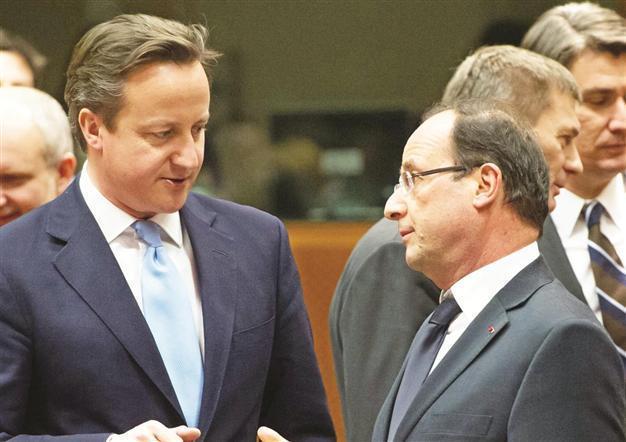Britain, France firm on defying Syrian arms ban
LONDON / PARIS

British Prime Minister Cameron (L) speaks with French President Hollande during an EU summit in Brussels in this photo. Britain and France do not rule out the option of arming Syrian rebels but met with resistance from the EU. AFP photo
Britain and France raised the pressure on other European Union members March 12 to lift a ban on supplying arms to Syria, where anti-government rebels are outgunned by forces loyal to President Bashar al-Assad.Britain warned that it could break with the embargo altogether, which requires unanimous agreement by the EU’s 27 members to take effect, while France hinted it would push to get the bloc to agree to amend the ban to allow the supply of arms.
The arms embargo is part of a package of EU sanctions on Syria that currently roll over every three months, with the last extension unanimously agreed by the EU last month and which came into effect on March 1. Without unanimous agreement to either renew or amend the ban in three months’ time, the embargo lapses.
‘We can have independent policy’
“I hope that we can persuade our European partners, if and when a further change becomes necessary, they will agree with us,” Cameron told a parliamentary committee when asked whether Britain could “veto” the embargo. “But if we can’t, then it’s not out of the question we might have to do things in our own way. It’s possible. We are still an independent country, we can have an independent foreign policy.”
Britain has not explicitly said it wants to arm the rebels, but has repeatedly said it does not rule out the option, depending on events on the ground.
In France, Foreign Minister Laurent Fabius said “a new balance of power” had to be created in Syria.
“We understand the idea of not adding weapons to weapons, but that position doesn’t work in the face of reality and that [reality] is that the opposition is being bombarded by others who are getting weapons while they are not. It’s a difficult position to keep,” he said.
After weeks of wrangling last month, Britain pushed for and won EU agreement to relax the embargo to allow non-lethal but quasi-military aid such as body armor and armored vehicles to be supplied to the rebels.
However, Britain and France say more must be done, while Germany has warned that giving the rebels with arms could lead to a proliferation of weapons in the volatile region and spark a proxy war.
Fabius said France would take steps on the embargo issue in the coming days without specifying what would be done. According a senior French official who spoke on condition of anonymity, anti-aircraft missiles are among those weapons being considered for supply to rebel fighters in Syria.
Addressing concerns about weapons falling into the wrong hands, a Foreign Office official said Britain was confident of the moderate credentials of those it planned to help.
“We’re talking to the opposition constantly about a whole range of support and we know who the people we want to work with are ... It’s important to bolster the moderate elements of the opposition. We know who these are,” the official told Reuters.
















